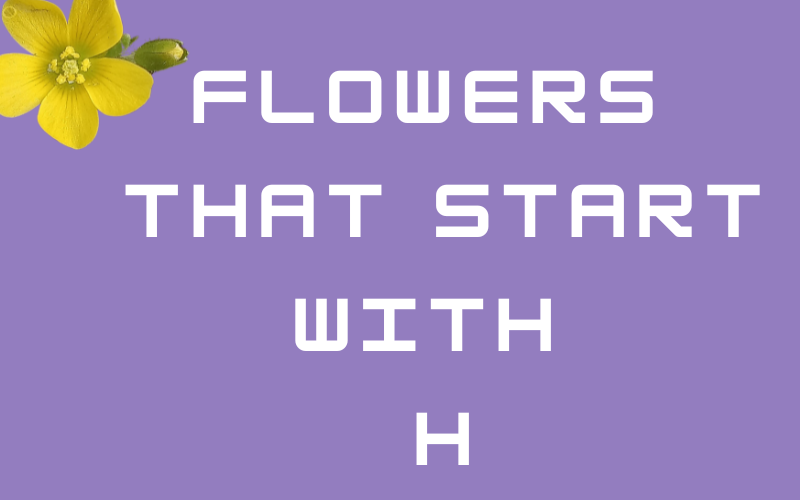There are many beautiful flowers name starting with D. One of the most popular is the hydrangea, known for its large, showy flower clusters in shades of blue, pink, and white. Another gorgeous H flower is the hibiscus, known for its bright and colorful blooms that are often seen in tropical climates.
The hollyhock is a tall, stately flower with a variety of colors ranging from white to pink to red. The heliotrope is known for its sweet fragrance and tiny purple or blue flowers. The honeysuckle is a fragrant vine with delicate, trumpet-shaped flowers in shades of pink, orange, and yellow.
Finally, the heather is a small, low-growing plant with delicate, bell-shaped flowers in shades of pink, purple, and white. No matter which H flower you choose, each one is unique and beautiful in its own way.
Flowers Name Starting with H
Hibiscus
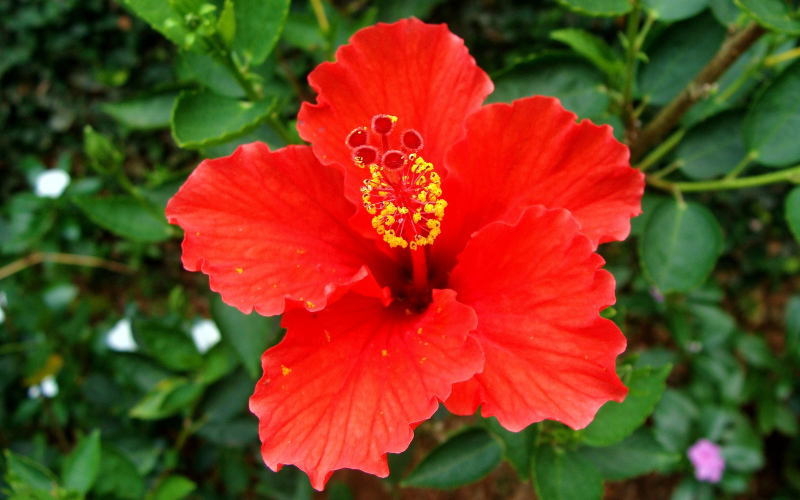
Hibiscus is a beautiful, brightly colored flower. It is native to China, India, Malaysia, Nigeria, and Hawaii. Hibiscus flower tea is also known to have a relaxing impact on the body and can help in the relief of anxiety and tension.
Hibiscus is commonly used in cosmetics and hair products due to its high levels of Vitamin C, which is known to promote healthy and glowing skin and hair. Overall, hibiscus is a beautiful and versatile plant with many benefits for both the body and mind.
| Scientific Name | Rosa-sinensis |
| Native Range | China, India, Malaysia, Nigeria, and Hawaii |
| Flowering Season | Late spring |
Heather
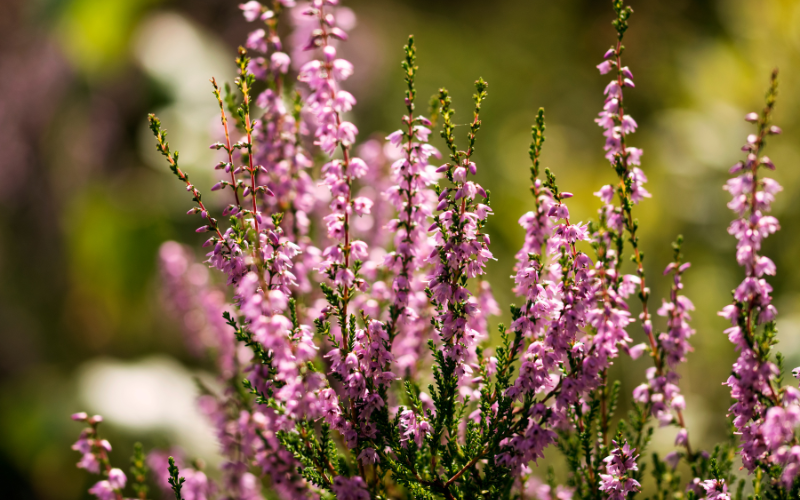
The heather flower is a beautiful and unique flowering plant. That is native to parts of Europe and Asia. It typically blooms from late summer to early fall and produces small, bell-shaped flowers in shades of pink, white, and purple.
It also has a rich cultural history, with associations with ancient Scottish and Irish folklore. In traditional medicine, heather has been used to treat various ailments, including digestive issues and respiratory problems. Additionally, the honey produced from heather flowers is highly prized for its distinct flavor and medicinal properties.
| Scientific Name | Calluna vulgaris |
| Native Range | British Isles, Scandinavia, and parts of Central and Eastern Europe |
| Flowering Season | Late summer through early autumn |
Hebe
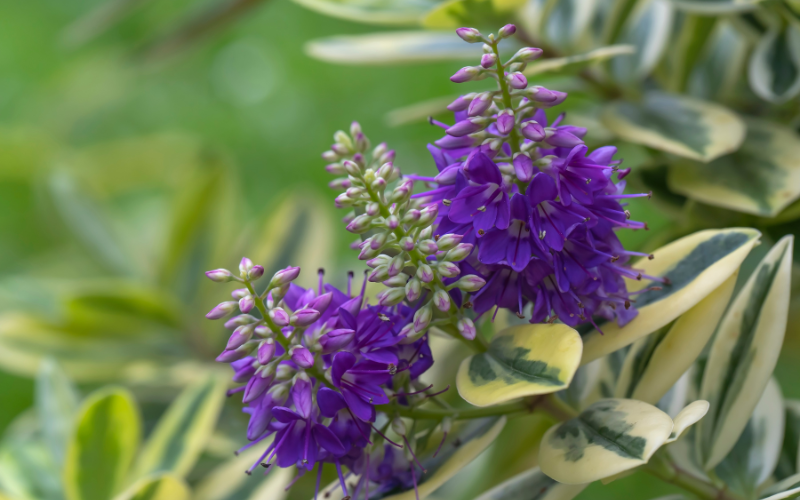
Hebe flowers beautiful plants. It also known as Veronica, is a flowering plant that is native to New Zealand and South America. It is a popular garden plant due to its beautiful and colorful flowers that bloom in the late spring and summer months.
These flowers come in a variety of shades including white, pink, blue, and purple. The Hebe flower is a hardy plant that can tolerate a wide range of growing conditions, making it a great choice for home gardeners.
| Scientific Name | Hebe |
| Native Range | New Zealand, North Island, South Island, and Stewart Island |
| Flowering Season | Late spring to early summer |
Helenium
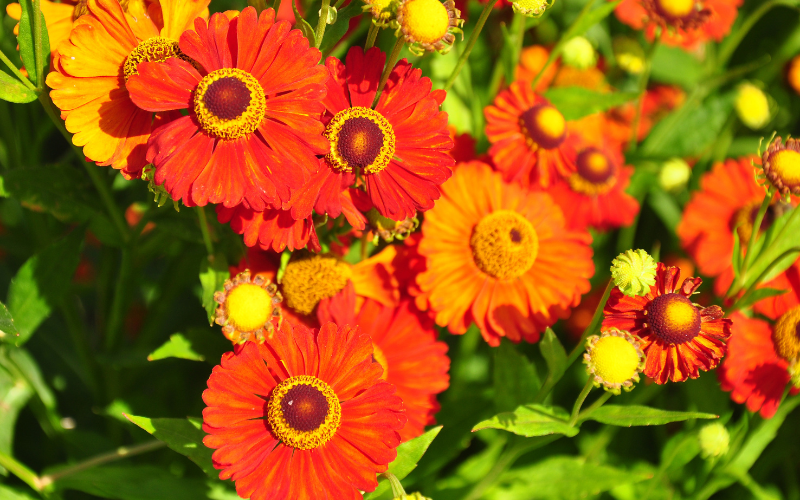
The helenium flower is a beautiful and hardy plant that deserves a place in every garden. It belongs to the Aster family and comes in a variety of colors, including shades of yellow, orange, red, and brown.
The plant is known for its long bloom time, which often lasts from early summer to the first frost. Helenium is a low-maintenance plant. The plant prefers full sun, but can also tolerate a bit of shade. Helenium is also attractive to pollinators such as bees and butterflies, making it a great addition to any wildlife garden.
| Scientific Name | Helenium |
| Native Range | Central America |
| Flowering Season | Summer |
Hellebore
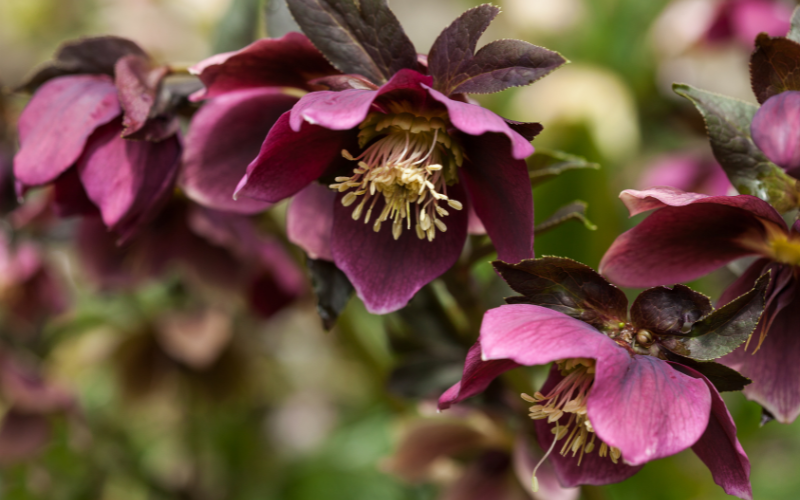
Hellebore flowers are a stunning addition to any garden during the winter months. The flowers come in a range of colors, from pure white to dark, rich purple. One of the most interesting things about Hellebores is their ability to produce a type of antifreeze in their tissues, allowing them to survive harsh winter conditions.
In addition to their beauty, Hellebores are also believed to have medicinal properties and have been used for centuries as a treatment for various ailments, including headaches and nervous disorders.
| Scientific Name | Helleborus |
| Native Range | Europe and Western Asia |
| Flowering Season | Late winter |
High Mallow
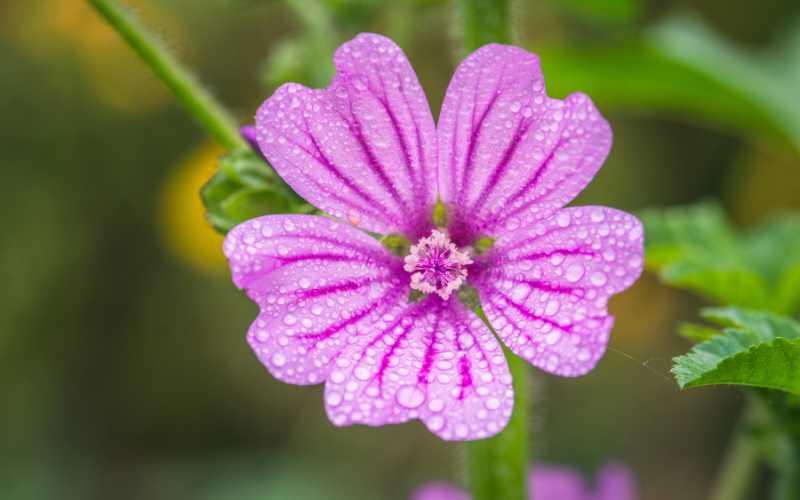
High Mallow flower is a beautiful flowering plant. That is native to Europe and Asia. The flower is known for its medicinal properties and has been used to treat a variety of health conditions for centuries.
One of the most interesting facts about High Mallow flowers is that the leaves and flowers can be eaten and are often used in salads or as a garnish for dishes. The petals of the flower can also be dried and used to make a tea that has a mild, pleasant taste and is known for its calming properties. Overall, High Mallow flowers are a versatile and beneficial plant that can be enjoyed both for their beauty and their health benefits.
| Scientific Name | Malva sylvestris |
| Native Range | Europe and North Africa |
| Flowering Season | Summer |
Hollow Root
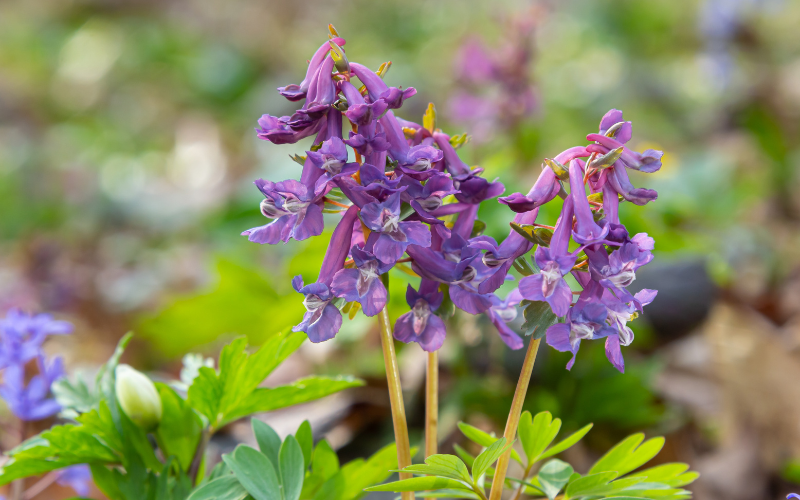
The Hollow Root flower is a beautiful flower endemic to China. This unique plant is named for its hollow roots, which are used in traditional Chinese medicine to relieve pain, reduce inflammation, and promote healing.
Despite this, there are ongoing efforts to preserve this beautiful and useful plant. The Hollow Root flower is not only a stunning addition to any garden, but it also has medicinal properties that make it a valuable resource for those seeking natural remedies for pain relief and healing.
| Scientific Name | Corydalis cava |
| Native Range | Europe |
| Flowering Season | Late spring, Summer |
Honesty
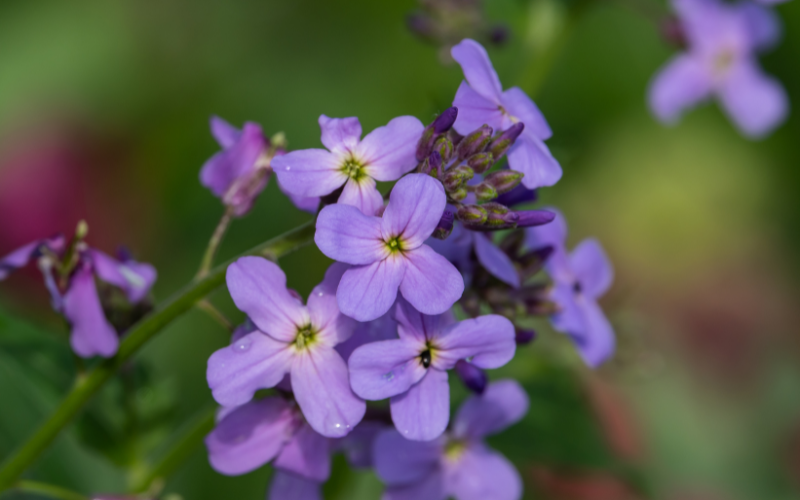
The honesty flower is a beautiful and unique addition to any garden. The honesty flower is a biennial plant, meaning it takes two years to complete its life cycle. In the first year, it produces a rosette of leaves close to the ground. In the second year, it sends up tall stalks with clusters of purple or white flowers. The plant prefers full sun to partial shade and well-drained soil.
The honesty flower is not only beautiful but also has medicinal properties. It has been used for centuries to treat respiratory problems and as a diuretic. The honesty flower is a stunning and useful addition to any garden.
| Scientific Name | Lunaria annua |
| Native Range | Europe, Germany, France, Italy, and the United Kingdom |
| Flowering Season | Mid-late spring to early summer |
Honeysuckle
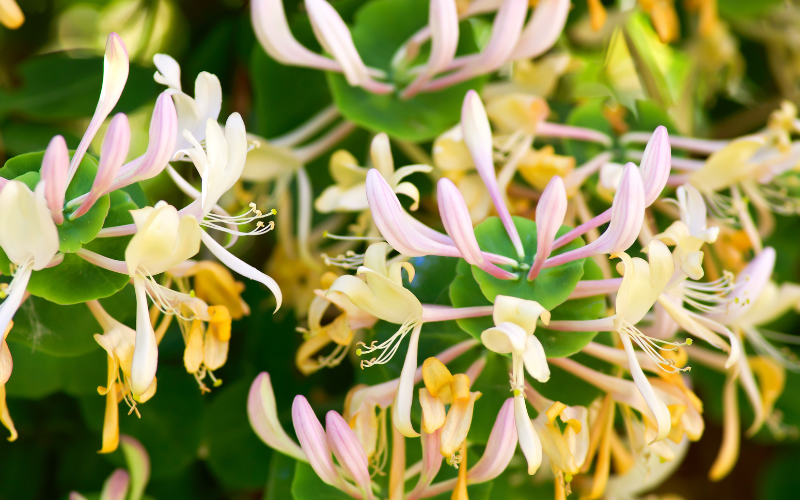
Honeysuckle flowers are beautiful and fragrant flowers that come in many different colors like white, pink, yellow, and red. These flowers are known for their sweet nectar, which attracts bees, butterflies, and hummingbirds.
Honeysuckle flowers have a long and storied history, being used in traditional Chinese medicine for centuries to treat a range of ailments including fevers, sore throats, and skin infections. With their beautiful blooms and sweet scent, it’s no wonder that honeysuckle flowers are beloved by gardeners, herbalists, and nature lovers everywhere.
| Scientific Name | Lonicera |
| Native Range | North America, Europe, Asia, and some parts of Africa |
| Flowering Season | Summer |
Hosta
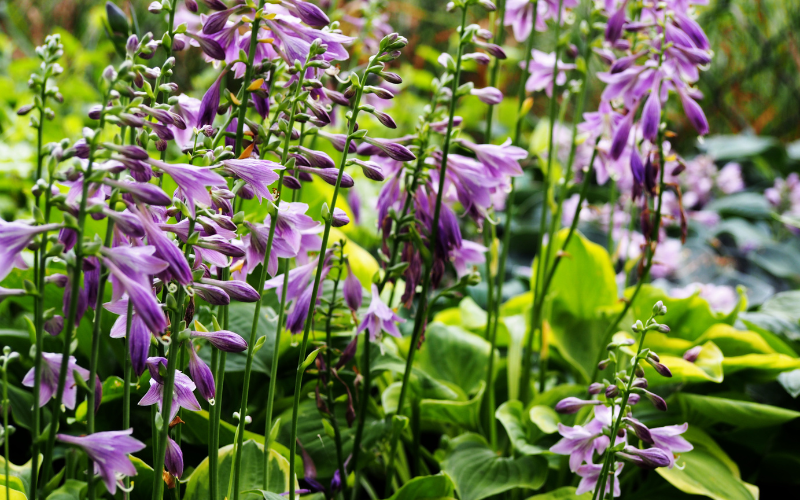
Hosta flowers are a popular choice for gardeners who want to add a touch of elegance to their flower beds. These beautiful plants are known for their large, lush foliage, and delicate flowers that bloom in the summer months. Hosta flowers come in a range of colors, including shades of blue, white, purple, and pink.
They are also available in a variety of sizes, from small plants that are perfect for edging flower beds, to larger varieties that can be used as focal points in a garden. Hosta flowers are easy to care for and can be planted in a range of soil types, making them a great choice for gardeners of all levels of experience. They are low-maintenance plants.
| Scientific Name | Hosta plantaginea |
| Native Range | East Asia, particularly Japan, Korea, and China |
| Flowering Season | Late spring to midsummer |
Haemanthus
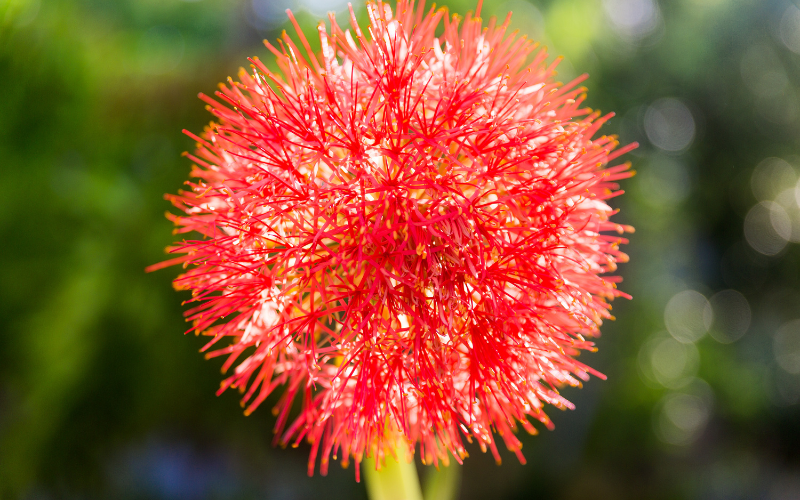
Haemanthus is a unique and visually appealing plant in the Amaryllidaceae family and is native to South Africa. It is also known as a blood lily. Haemanthus can produce pink, orange, or white blossoms and are typically 15 to 45 cm (6 to 18 inches) tall. They bloom in late winter or early spring and require a well-draining soil mix.
These flowers are not only attractive but also highly adaptive and resilient, due to their thick, fleshy leaves and sturdy stems. Haemanthus provides a touch of exotic appeal to any environment, whether grown indoors or as a garden accent.
| Scientific Name | Haemanthus |
| Native Range | Southern tip of Africa |
| Flowering Season | Summer to fall |
Hoya
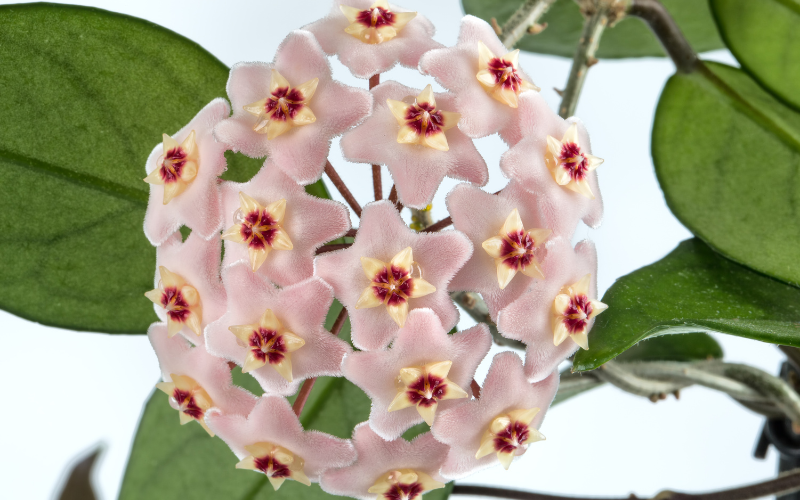
Hoya, often known as wax plants or porcelain flowers, are a family of beautiful and unique flowers native to Asia and Australia’s tropical and subtropical areas. Hoyas are amazing due to their ability to grow clusters of aromatic, star-shaped flowers in a variety of colors, including white, pink, and red.
They prefer well-draining soil and flourish in bright, indirect light. These flowers have a sweet and appealing smell that influences the air, making them a welcome addition to any house or garden.
| Scientific Name | Hoya |
| Native Range | Southeastern Asia to Australia |
| Flowering Season | Spring or summer |
Himalayan Blue Poppy
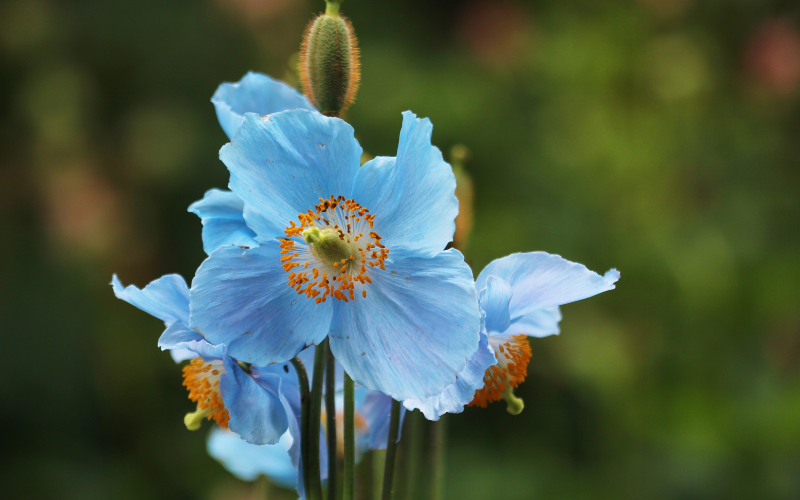
The Himalayan Blue Poppy is a stunningly gorgeous flower native to the Himalayan mountains. It is scientifically known as Meconopsis betonicifolia. It grows up to 4 inches in diameter and is known for its brilliant and mesmerizing blue petals.
It thrives in a cold and humid climate with well-drained soil. The Himalayan Blue Poppy is a floral gem that adds a sense of wonder and awe wherever it blooms. The uniqueness and beauty of this blossom make it a treasure to see, an illustration of nature’s stunning splendor.
| Scientific Name | Meconopsis betonicifolia |
| Native Range | South-central China |
| Flowering Season | Late spring through early summer |
Herb Robert
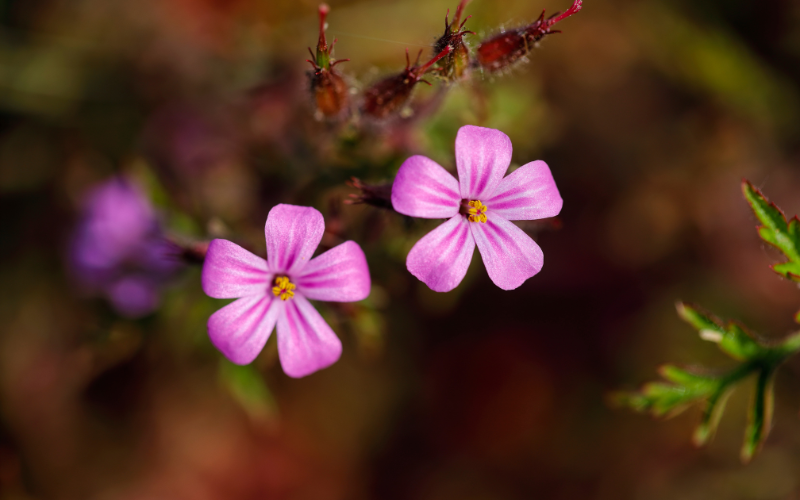
Herb Robert or Geranium robertianum, is an unique and adaptable herb with several medical traits that have been used for ages. This fragile, tiny shrub is native to Europe. Herb Robert is a little bursting plant that blooms in the spring and summer, with brilliant pink or purple blossoms.
It has been used to cure a variety of issues, including digestive disorders, respiratory troubles, and skin conditions. Whether you’re looking for herbal remedies or want to beautify your garden, Herb Robert is an amazing herb that deserves greater focus.
| Scientific Name | Geranium robertianum |
| Native Range | Temperate regions of North America, Europe, northern Africa, and Western Asia |
| Flowering Season | Spring through fall |
Hyssop
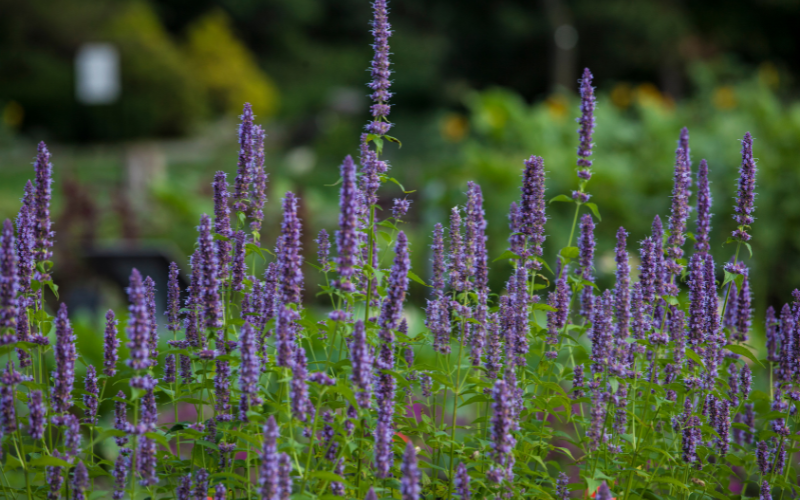
Hyssop is a Mediterranean herb with purple flowers and aromatic leaves which grows to about 1 to 2 feet tall, attracts bees and butterflies, and has medicinal uses for respiratory and digestive issues. It is also known for its antibacterial and anti-inflammatory properties, making it popular for treating coughs, colds, sore throats, and blooms from mid to late summer.
Hyssop is a stunning addition to any yard or floral arrangement, and it is undeniably an effective and attractive plant that continues to charm and benefit people.
| Scientific Name | Hyssopus officinalis |
| Native Range | Northwestern Africa, Europe, and Western Asia |
| Flowering Season | Summer |
Honeywort
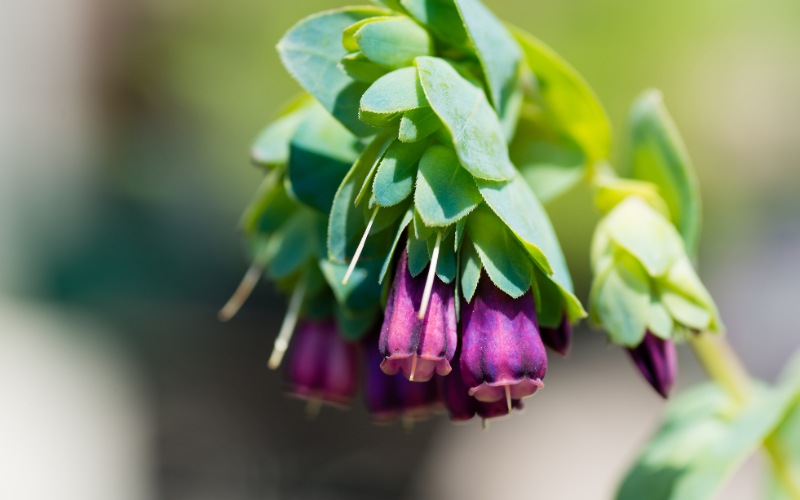
Honeywort, also known as Cerinthe major, is a gorgeous Mediterranean plant that thrives in well-drained soil and full light, is drought-tolerant, and can handle warmth, idle for warmer areas.
It normally grows to a height of 1 to 3 feet (30 to 90 cm) and gives a splash of color and texture to any space with its bright purple-blue flowers and silver-green foliage. Honeywort provides a bit of exotic beauty to any garden and is not only visually appealing but has a lovely aroma that attracts bees and other pollinators.
| Scientific Name | Cerinthe major |
| Native Range | The Mediterranean region |
| Flowering Season | Spring to fall |
Harebell
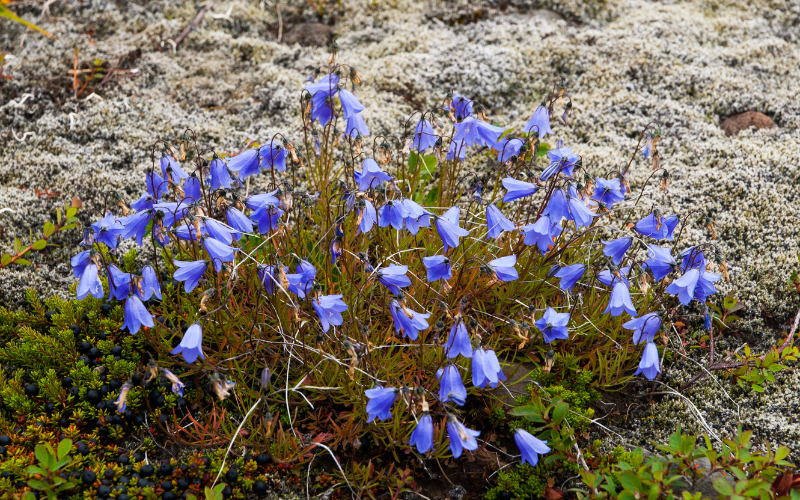
Harebell is a lovely flower native to Europe, North America, and Asia. It is also known as Campanula rotundifolia. It blooms from early summer to early autumn, enjoys full sun or light shade, and grows to a height of 6 to 18 inches (15 to 45 cm). It comes in a variety of colors, from pale blue and lavender to lilac and white.
It is also used to treat digestive issues and respiratory diseases, and even as a diuretic. The delicate and graceful look of the Harebell, together with its rich history and medicinal properties, make it an attractive and valuable addition to any garden.
| Scientific Name | Campanula rotundifolia |
| Native Range | Temperate Europe and Asia |
| Flowering Season | Summer through fall |
Hottentot Fig
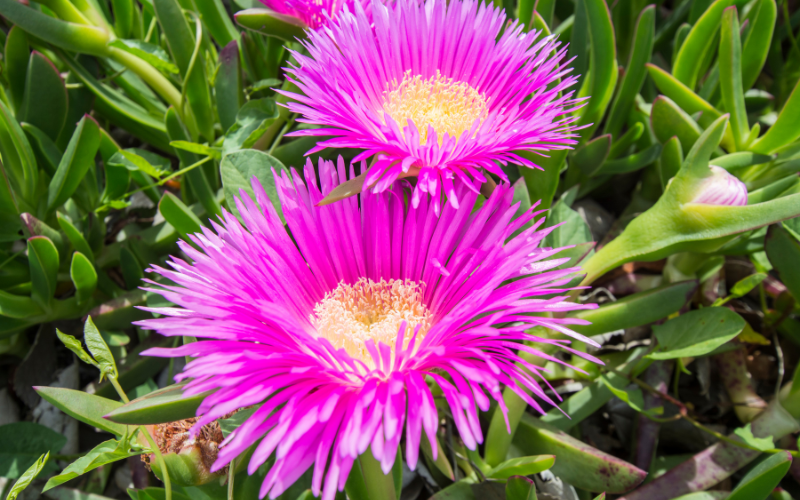
The Hottentot Fig is an amazing flower of the Aizoaceae family. It is native to South Africa and bears flowers in pink, purple, and yellow, and can grow to a height of 6 to 12 inches (15 to 30 cm). It is also known as Carpobrotus edulis.
It has long been used to treat wounds, burns, and skin irritations. Hottentot Fig blooms from late spring to early summer and thrives in well-drained sandy or rocky soils. This is a diverse and attractive flower that adds beauty and therapeutic benefits to its native environment.
| Scientific Name | Carpobrotus edulis |
| Native Range | Cape Provinces of South Africa |
| Flowering Season | Spring to early fall |
Hydrangea
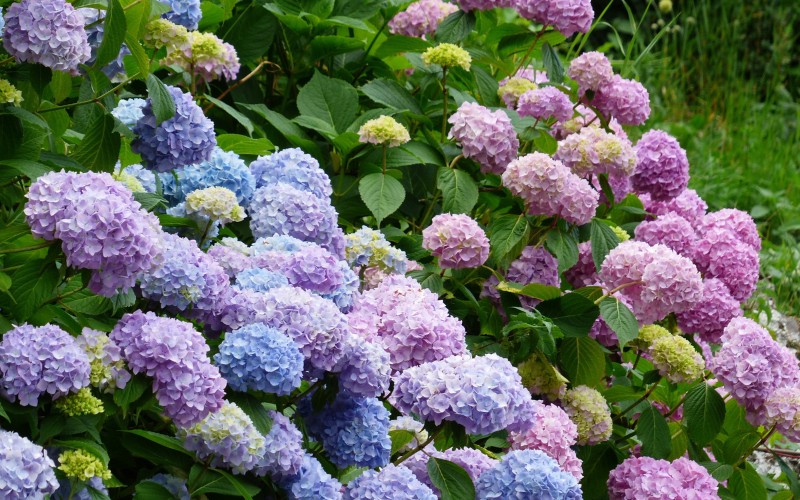
Hydrangeas, among the members of the Hydrangeaceae family, are a beautiful and popular flower native to Asia and the Americas. They come in a variety of colors, including pink, blue, purple, and white. They normally bloom in the summer and thrive in well-drained, moist soil.
Hydrangea has also been used medicinally because its roots contain anti-inflammatory and diuretic chemicals. Hydrangeas are one of the most popular and desirable flowers in the world of horticulture due to their amazing beauty and different medicinal properties.
| Scientific Name | Hydrangea |
| Native Range | Southeastern Asia, North America, and South America |
| Flowering Season | Spring through early fall |
Hesperantha
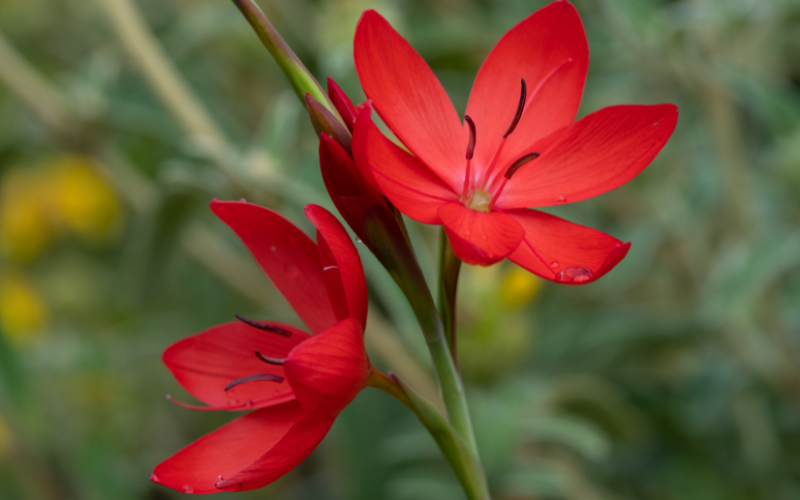
Hesperantha, or River Lily, is a gorgeous flower native to South Africa that belongs to the Iridaceae family. These are famous for their eye-catching colors, like pink, orange, red, and white, and usually bloom in late summer or early autumn.
Hesperantha thrives in well-drained soil and prefers a sunny or partially shaded location and has been used in traditional medicine for its possible medicinal powers, especially in the treatment of fevers and digestive problems. This is a wonderful and fascinating flower to look at owing to its beauty and potential healthcare effects.
| Scientific Name | Hesperantha |
| Native Range | Southern and eastern-central Africa |
| Flowering Season | Late summer to first frost |
Heliotrope
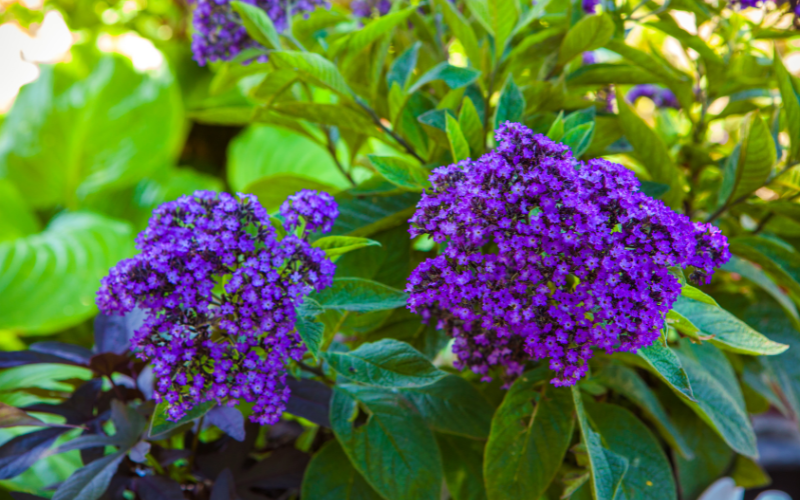
Heliotrope, or Heliotropium arborescens, is a beautiful flower in the Boraginaceae family. This flower is native to Peru and comes in purple, lilac, and white colors. It blooms from late spring to early autumn and thrives on well-drained soil rich in organic matter.
These are frequently utilized in fragrances and essential oils due to their powerful scent. Its leaves and petals contain anti-inflammatory and relaxing natural components, making it a popular element in traditional herbal treatments and cosmetic products.
| Scientific Name | Heliotropium arborescens |
| Native Range | Northwestern South America |
| Flowering Season | Summer to fall |
Hardy Fuchsia
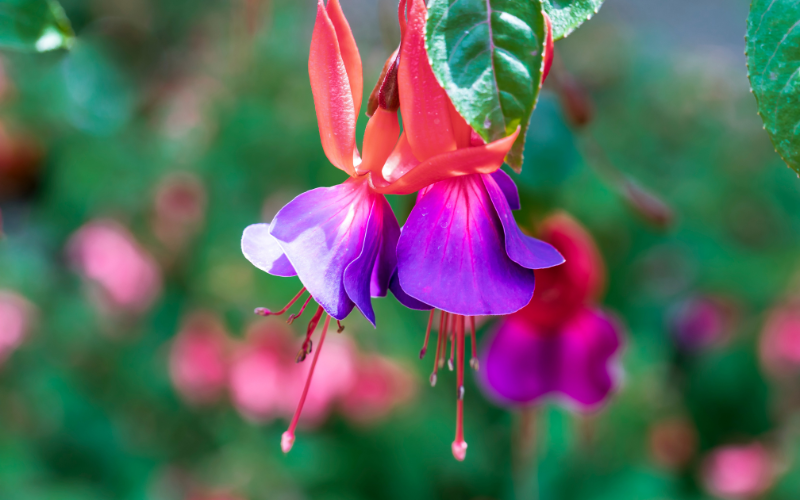
Hardy Fuchsia, or Fuchsia magellanica, is a beautiful flower native to South America that belongs to the Onagraceae family which comes in a variety of colors, including pink, purple, and red, and blooms from late spring to early fall, luring hummingbirds and butterflies with its pendulous flowers.
Hardy Fuchsia thrives in well-drained, rich soil, and its leaves, flowers, and fruits also contain chemicals that have anti-inflammatory and antioxidant properties. The Hardy Fuchsia is an eye-catching flower that requires little care and rewards with its stunning beauty.
| Scientific Name | Fuchsia magellanica |
| Native Range | Southern tip of South America |
| Flowering Season | Summer to the first frost |
Hoop Petticoat Daffodil
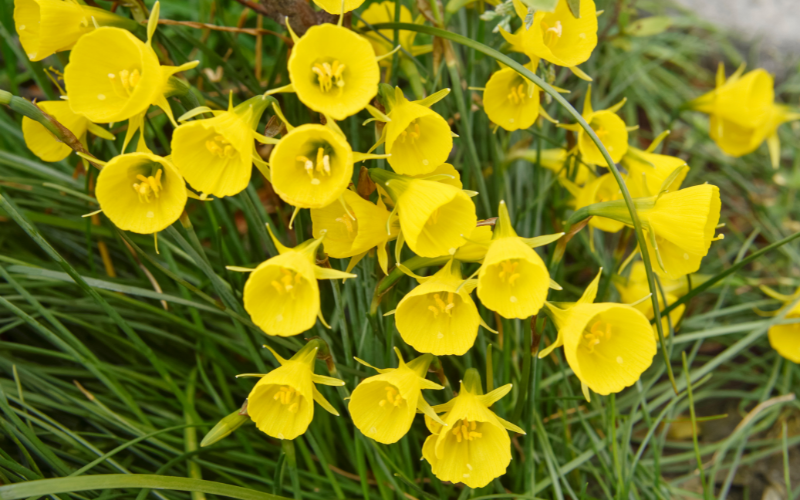
The Hoop Petticoat, or Narcissus bulbocodium, is a member of the Amaryllidaceae family and native to Southern Europe and North Africa. It occurs in a variety of colors, including golden yellow, and white, and thrives in well-draining, organic-rich soils. This flower blooms in early spring and grows to nearly 6 to 10 inches (15 to 25 cm) tall.
It stands out by its unique shape, which is like a little hoop skirt, with a cluster of bright yellow or white flowers around a trumpet-shaped crown. Hoop Petticoat may provide a lovely and eye-catching show in flower beds, rock gardens, or pots.
| Scientific Name | Narcissus bulbocodium |
| Native Range | Iberian Peninsula |
| Flowering Season | Early spring |
Hollyhock
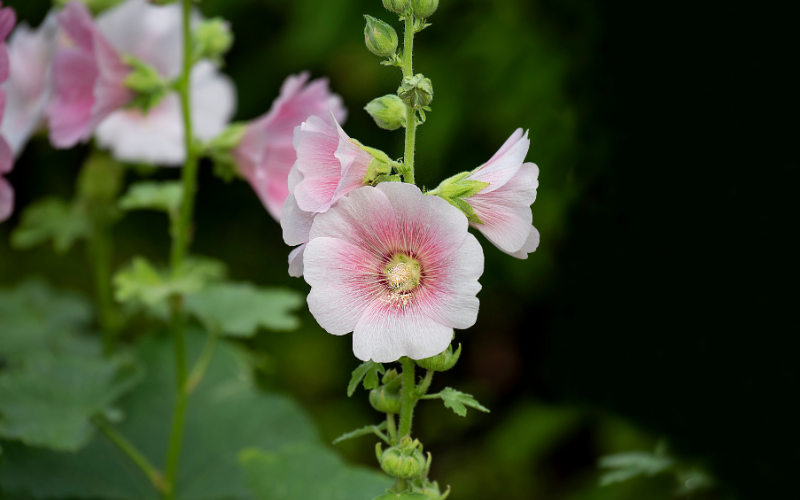
Hollyhock is a beautiful flowering plant of the mallow family. It is commonly known as Alcea rosea. This Asian and European native comes in a variety of colors, including pink, purple, red, white, and even yellow, and can grow to a height of 6 feet or even more.
They bloom from early summer to mid-fall and cherish well-drained soil with full sun. Because of their tall, elegant stalks and brilliant, beautiful blooms, hollyhocks have become popular garden plants all around the world.
| Scientific Name | Alcea rosea |
| Native Range | Turkey |
| Flowering Season | Summer |
Houseleek
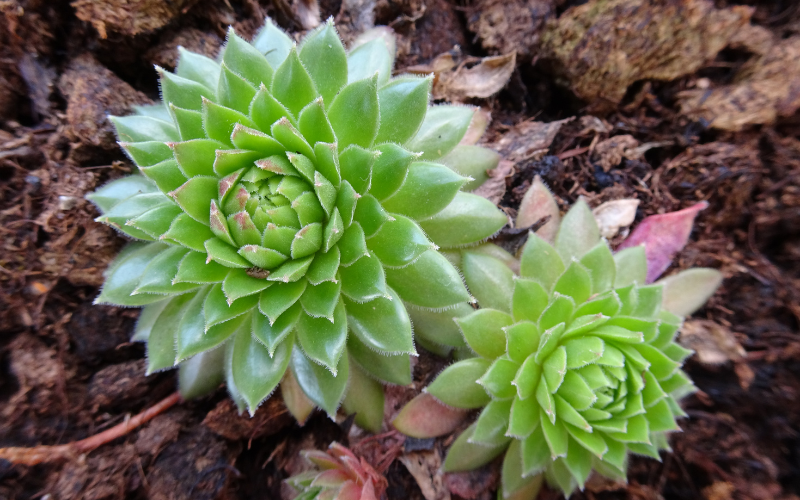
Houseleek is a beautiful flower of the Crassulaceae family. It is also known as Sempervivum. This European native blooms from late spring to early summer and comes in a range of hues, such as green, red, purple, and even silver.
Houseleek thrives in well-draining sandy or loamy soil and is widely used for its medicinal traits which have healing abilities and defend against evil spirits. Houseleeks are a lovely addition to any garden. Their resilience, bright leaves, and unique blooming patterns set them apart.
| Scientific Name | Sempervivum |
| Native Range | Europe and the Middle East |
| Flowering Season | Spring and summer |
Hyacinth
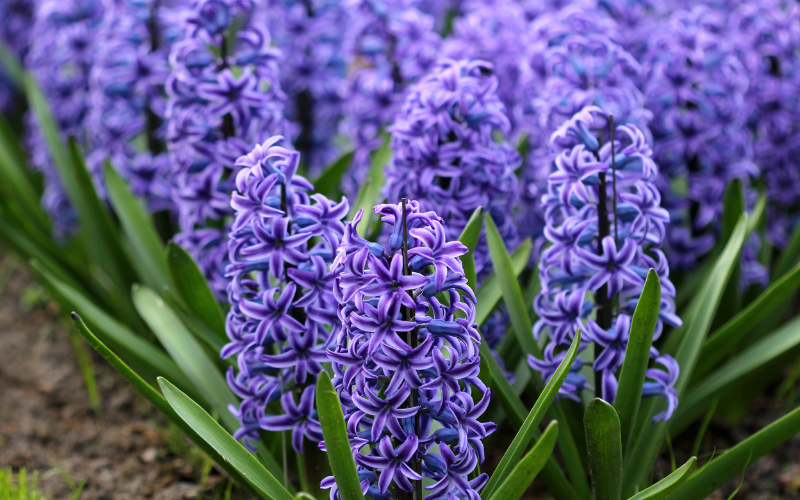
The Asparagaceae family includes the beautiful and scented flower hyacinth. It comes in a range of colors, including blue, purple, pink, and white, and is native to the Mediterranean region and parts of Asia.
This species blooms in the spring and thrives in well-draining soil rich in organic compounds. Hyacinths are a popular choice for both professional florists and home gardeners because they offer a touch of elegance to any landscape or interior arrangement.
| Scientific Name | Hyacinthus orientalis |
| Native Range | Eastern Mediterranean |
| Flowering Season | Early to mid-spring |
Helichrysum
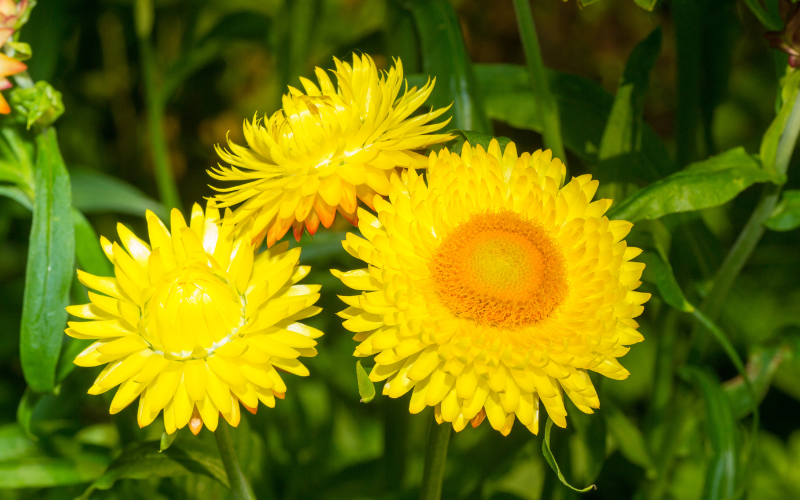
Helichrysum is a beautiful plant in the Asteraceae family. This plant is native to Africa, Australia, and Europe, and it comes in a range of hues like yellow, orange, pink, and even purple. These flowers bloom during the summer months and need well-drained fertile soil.
They normally grow to be 12 to 36 inches (30 to 90 cm) tall. Helichrysum’s daisy-shaped blooms and its delightful fragrance will delight any gardening enthusiast or flower lover, whether grown in borders, containers, or wildflower fields.
| Scientific Name | Helichrysum |
| Native Range | Africa, Europe, western and Central Asia, and Australia |
| Flowering Season | Summer |
Hemerocallis
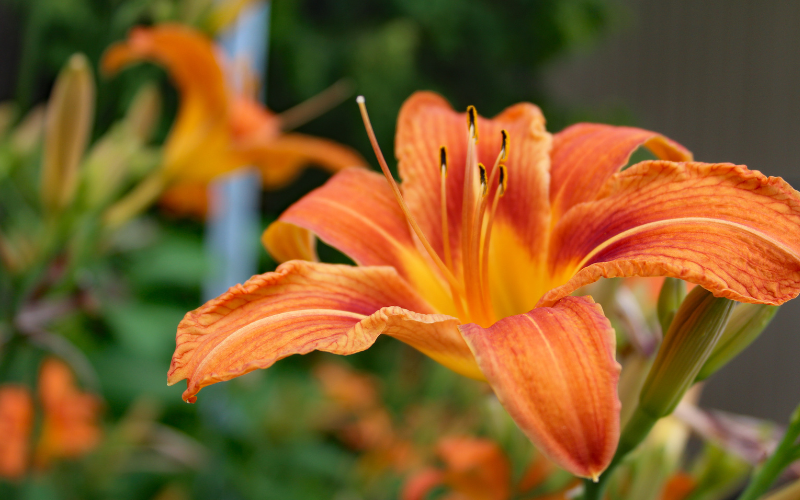
Hemerocallis, also known as daylilies, is a fascinating and diverse species of flowers. They are members of the Hemerocallidaceae family and are native to Asia, notably China, Korea, and Japan.
Daylilies bloom from late spring to early October and come in a variety of colors such as yellow, orange, red, pink, and purple. They may grow in a variety of soil conditions but prefer well-drained soil. Hemerocallis is a beautiful addition to any garden, giving elegance and charm.
| Scientific Name | Hemerocallis |
| Native Range | Asia and the Eastern Mediterranean region |
| Flowering Season | Spring to first frost |
Heart’s-Ease
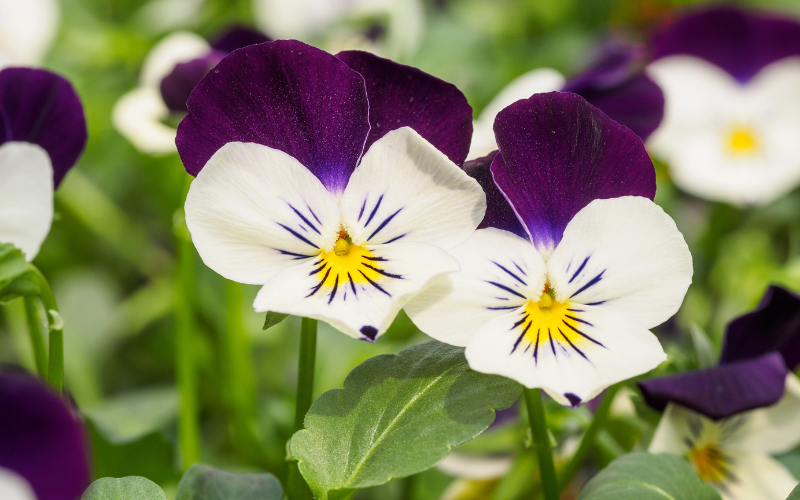
Heart-ease, also known as Viola tricolor, is a delicate and attractive flower native to Europe that belongs to the Violaceae family. It comes in a variety of colors, including purple, yellow, white, and blue, and blooms from spring to early summer.
It thrives in well-draining, organic-rich soil. Heart’s-Ease grows to a height of about 4 to 8 inches (10 to 20 cm). This flower’s blooms are very attractive, attracting bees, butterflies, and other pollinators and adding beauty and joy to any space it graces.
| Scientific Name | Viola tricolor |
| Native Range | Europe and Western Asia |
| Flowering Season | Spring to fall |
Horse Chestnut
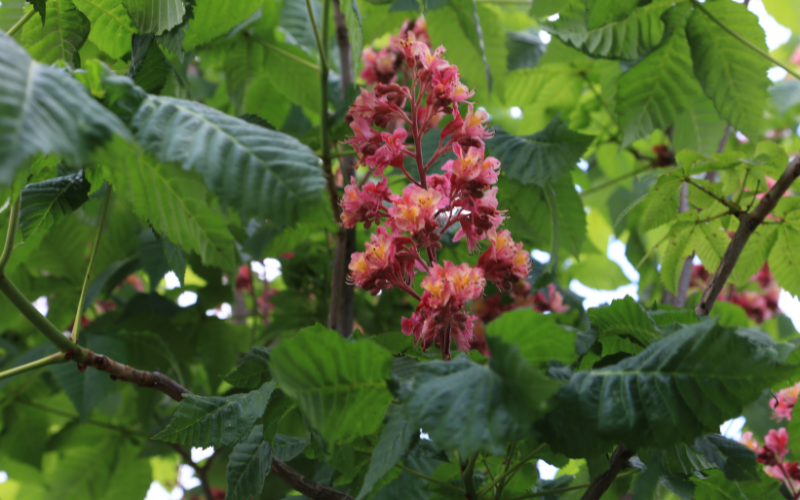
Horse Chestnut, or Aesculus hippocastanum, is a lovely Sapindaceae bloom native to the Balkans and Western Asia. The blossoms of the Horse Chestnut tree are amazing, with their cone-shaped clusters of creamy white petals that are usually mixed with a touch of pink or yellow at the base.
These flowers bloom in late spring or early summer and thrive in well-drained soils. With their majestic size, complex leaves, and appealing blossoms, horse chestnuts add both visual interest and natural charm to any landscape.
| Scientific Name | Aesculus hippocastanum |
| Native Range | The Western Mediterranean and Turkmenistan |
| Flowering Season | Spring |
Hypericum
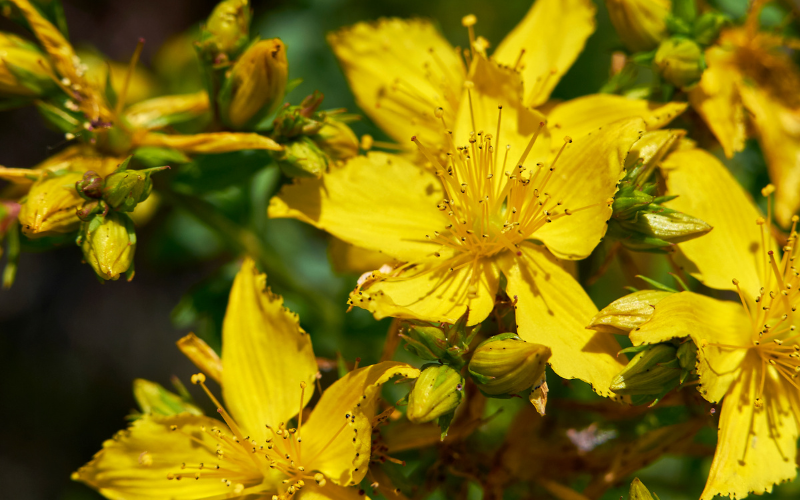
The Hypericum is a fascinating and beautiful flower. It is also known as St. John’s Wort. It is native to Europe, Asia, and North America. Hypericum flowers are typically bright yellow and have five petals.
Each flower is relatively small and usually measures around 1 to 2 centimeters in diameter. Hypericum species can be found in various habitats, including meadows, woodlands, and along roadsides.
| Scientific Name | Hypericum |
| Native Range | Europe, Asia, North America |
| Flowering Season | Late Spring to Early Summer |
Hollyhock

Hollyhock is a beautiful flower. It comes in a variety of colors, including shades of pink, purple, yellow, and white. The flowers are generally quite large, with individual blooms often measuring 3 to 4 inches (7.5 to 10 cm) or more in diameter.
They thrive in well-drained soil and prefer full sun, although they can tolerate some light shade.
| Scientific Name | Alcea |
| Native Range | Asia and Europe |
| Flowering Season | Summer |
Hyacinthoides
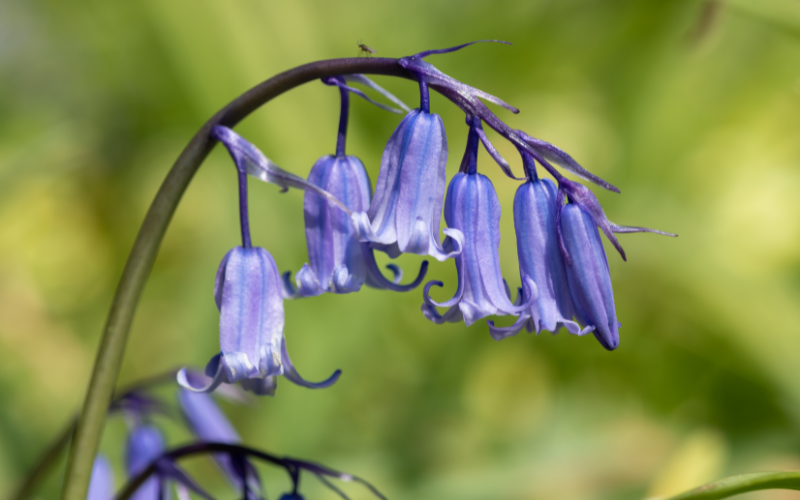
The Hyacinthoides is a stunning flower. It is known as bluebells. It is native to Europe, including the United Kingdom. The flowers are known for their striking violet-blue to purplish-blue flowers.
It thrives in shady woodland areas and carpets the forest floors in a beautiful display. It typically blooms in the spring. The flowers are typically small, measuring about 1 to 1.5 inches (2.5 to 4 cm) long.
| Scientific Name | Hyacinthoides |
| Native Range | Europe |
| Flowering Season | Spring |
Hyacinth Orchid
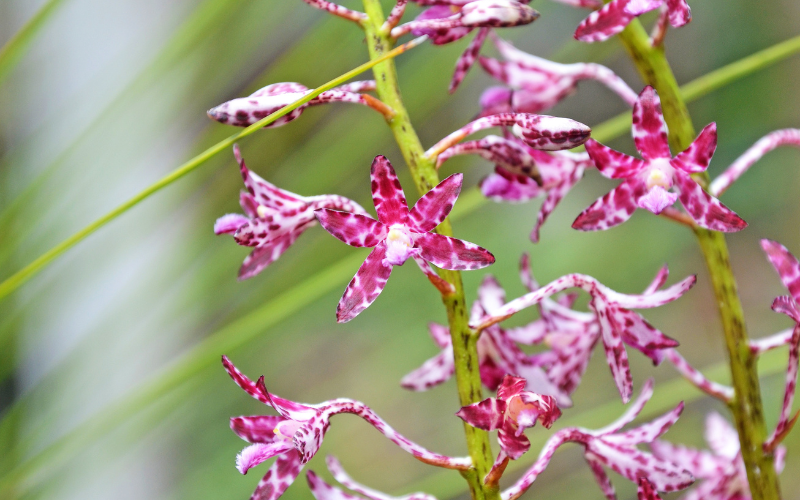
Hyacinth Orchid is a beautiful flower. It is scientifically known as Dipodium. It is native to Australia and Asia. The flowers come in a range of colors, including white, cream, and pink.
Hyacinth Orchid flowers are typically small to medium-sized, and they appear in clusters on a tall stem. They may bloom in late spring or early summer.
| Scientific Name | Dipodium |
| Native Range | Australia and Asia |
| Flowering Season | Late spring or early summer |
Hyacinth Bean
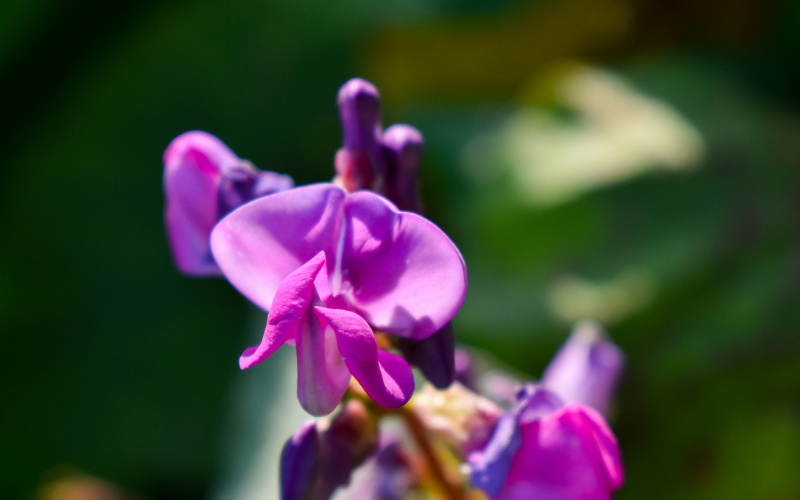
Hyacinth Bean is a lovely flower. It is scientifically known as Lablab purpureus. The flowers come in shades of purple, pink, and white. Hyacinth beans are relatively small, usually less than an inch in diameter.
It is a warm-season plant that thrives in full sun and well-drained soil. The flowers bloom in the summer and continue to produce flowers throughout the growing season.
| Scientific Name | Lablab purpureus |
| Native Range | Asia and Africa |
| Flowering Season | Summer |
Hound’s-Tongue
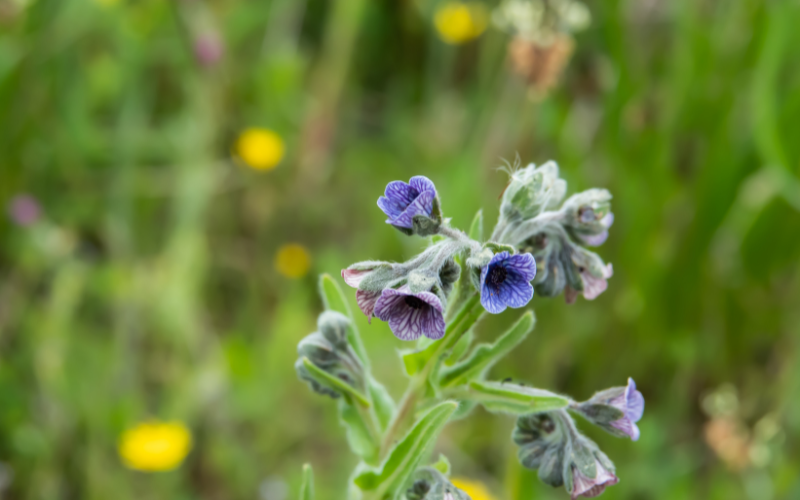
Hound’s-Tongue is a beautiful flower. It is scientifically known as Cynoglossum officinale. It is native to Europe and parts of Asia. The flowers are typically dark reddish-purple or maroon in color.
Hound’s-Tongue typically blooms in late spring to early summer. It often prefers well-drained soils and partial to full sun. The flowers themselves have a delicate and sweet fragrance that attracts bees, and butterflies.
| Scientific Name | Cynoglossum officinale |
| Native Range | Western Asia and Eastern Europe |
| Flowering Season | Late spring to early summer |
Hoary Vervain
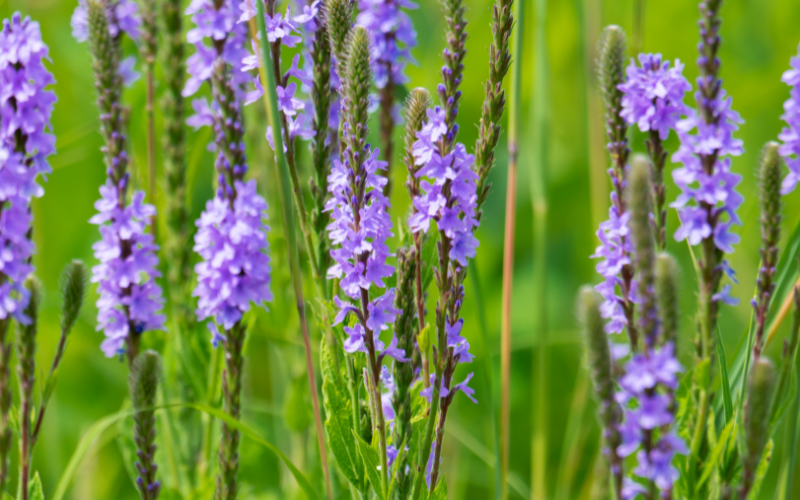
Hoary Vervain is a beautiful flower. It is scientifically named Verbena stricta. It is a native wildflower commonly found in North America. The flowers are typically lavender, violet, or purple in color.
Hoary Vervain blooms from late spring to early fall. It can tolerate a range of soil types but often prefers well-drained soils in sunny to partially shaded areas.
| Scientific Name | Verbena stricta |
| Native Range | North America |
| Flowering Season | Summer |
Horned Violet
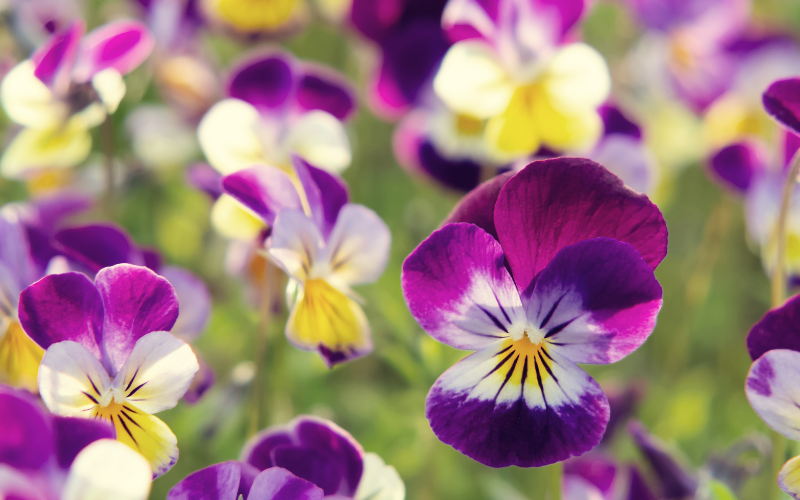
Horned Violet is a charming flower. It is also known as the Viola cornuta. It is Native to the Mediterranean region. These flowers come in various shades, including violet-purple, lavender, white, and yellow.
It thrives in well-drained soil and can be grown in both full sun and partial shade. It typically blooms in the spring.
| Scientific Name | Viola cornuta |
| Native Range | Mediterranean region |
| Flowering Season | Summer |
Horned Poppy
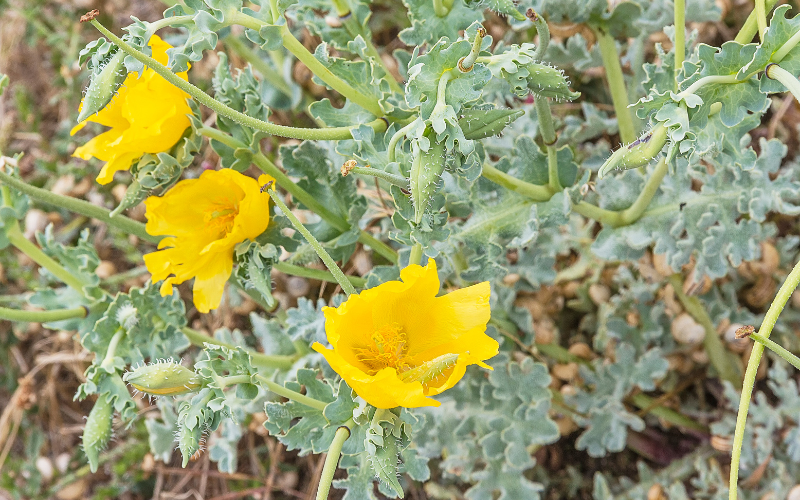
The horned Poppy is a beautiful flower. It is also known as Glaucium flavum. It is native to the Mediterranean region. The flowers are typically yellow or orange. Horned Poppy typically blooms in late spring and early summer.
The Horned Poppy’s flexibility and adaptability make it a fantastic addition to coastal gardens, as it thrives in sandy and salty environments.
| Scientific Name | Glaucium flavum |
| Native Range | Southern Europe |
| Flowering Season | Mid-Spring to Early Summer |
Hooker’s Lips
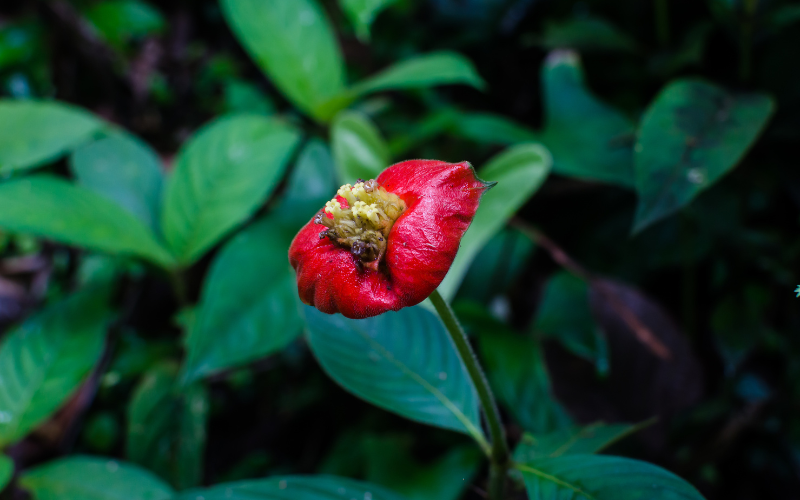
Hooker’s Lips is a stunning flower. It is scientifically known as Psychotria Elata. It is native to the rainforests of Central and South America. The most striking feature of Hooker’s Lips is its bright red bracts, modified leaves resembling a pair of full, red lips.
Hooker’s Lips thrive in the warm, humid, and shaded conditions of tropical rainforests. It can bloom throughout the year.
| Scientific Name | Psychotria elata |
| Native Range | Panama and Colombia |
| Flowering Season | Throughout The Year |
Question & Answer
What makes a perfect flower?
A perfect flower, also known as a bisexual flower, is a flower that contains both male and female reproductive structures within the same flower.
What is a flower in biology?
In biology, a flower is a reproductive structure found in flowering plants (angiosperms). Flowers are responsible for the sexual reproduction of these plants, facilitating the production of seeds that develop into new plants.
Do flowers need food?
Flowers require certain nutrients and energy sources to support their growth, development, and reproduction.
Which flower is the queen of winter?
The flower commonly referred to as the “Queen of Winter” is the Camellia (Camellia japonica).
